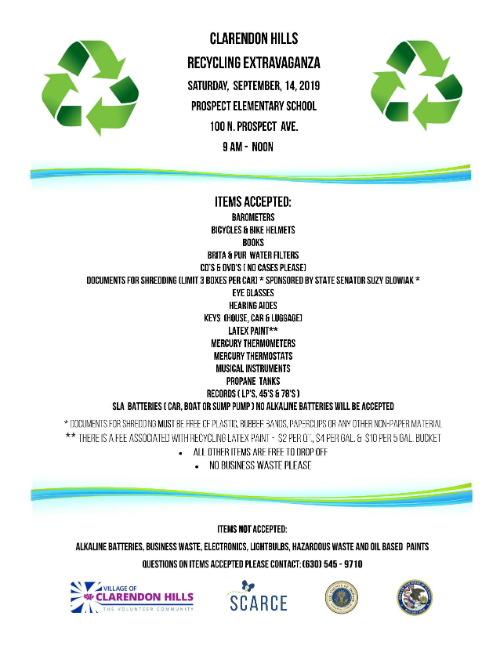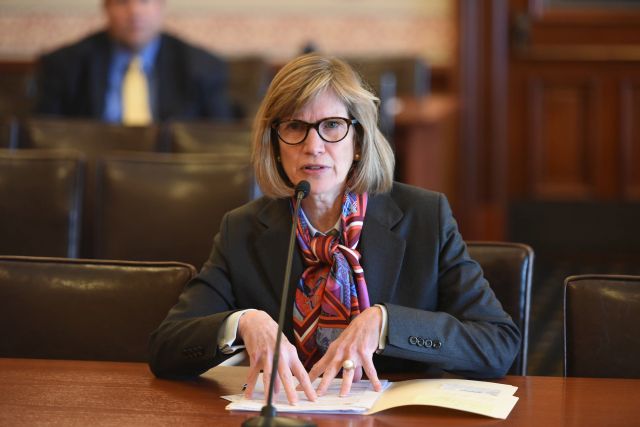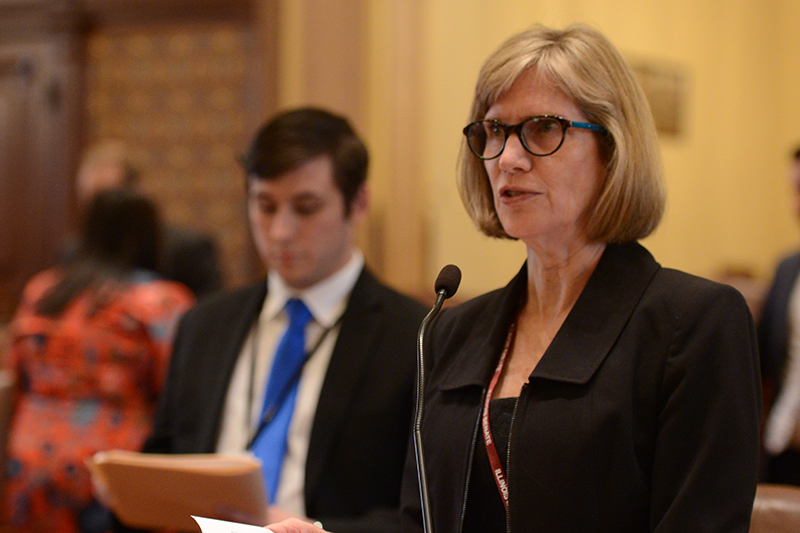- Category: Press Releases
 CLARENDON HILLS – Local residents are invited to participate in a mega recycling event on Saturday, Sept. 14 at Prospect Elementary School from 9 a.m. to noon.
CLARENDON HILLS – Local residents are invited to participate in a mega recycling event on Saturday, Sept. 14 at Prospect Elementary School from 9 a.m. to noon.
State Senator Suzy Glowiak Hilton (D-Western Springs) is partnering with SCARCE, the Village of Clarendon Hills, along with different organizations within DuPage County for an exclusive recycling event.
"Many of our unwanted and lighted used items can find a second life at SCARCE," Glowiak Hilton said. "Responsible recycling of barometers, water filters, batteries, and paint can help keep these chemicals and plastics out of the natural environment, together we can make DuPage a little bit greener."
Residents can recycle barometers, bicycles and bike helmets, books, Brita and Pur water filters, CD’s and DVD’s (not cases), eye glasses, hearing aids, keys, mercury thermometers and thermostats, musical instruments, propane tanks, records and the SLA batteries found in cars, boats or sump pumps.
Glowiak Hilton’s office is also providing shredding services. To accommodate as many residents as possible, participants are limited three boxes per person. To speed up the process, please ensure documents are free of plastic, rubber bands, paperclips or any other non-paper materials.
Latex paint can be recycled for a fee: $2 per quart, $4 per gallon and $10 per 5-gallon bucket.
Business waste will not be accepted.
For more information, Glowiak Hilton urges residents to reach out to her office at (630) 785-3177, reach out on Facebook at State Senator Suzy Hilton Glowiak or her website www.SenatorSuzyGlowiak.com.
- Category: Press Releases
 OAKBROOK TERRACE – Area residents can lend a hand to help soldiers overseas stay in touch with loved ones.
OAKBROOK TERRACE – Area residents can lend a hand to help soldiers overseas stay in touch with loved ones.
State Senator Suzy Glowiak Hilton (D-Western Springs) is excited to announce her office’s partnership with Cell Phones For Soldiers, a nonprofit organization which provides free communication services to active duty military personnel and veterans.
“Donating cellphones is a small way for us all to show our support to our brave men and women overseas,” Glowiak Hilton said. “This program helps keep families and loved ones connected when our military men and women often need it the most. Help us lend a hand to our brave heroes.”
Glowiak Hilton has designated her office a permanent drop off location for residents.
Residents can donate newer, gently used cell phones for men and women in the military to use, or they can donate broken or outdated mobile phones to be recycled for parts, with the resulting funds used to purchase prepaid international calling cards.
Cell Phones For Soldiers was founded in 2004 by Robbie and Brittany Bergquist, then 12 and 13, and has since provided more than 300 million minutes of free talk time to members of the military stationed around the world.
For more information, residents can contact the district office at (630) 785-3177.
- Category: Press Releases

Glowiak Hilton’s measure, Senate Bill 1726, which creates the position of Dementia Coordinator in the Department of Public Health to oversee the implementation of the Illinois Alzheimer's Disease State Plan, was signed into law on Monday.
“As someone who cared for a husband and mother with Alzheimer’s disease, I know how impossible it can seem,” Glowiak Hilton said. “Under the leadership of a statewide Dementia Coordinator, those living and caring for those with Alzheimer’s will have an advocate to fight for state policies that will improve their level of care.”
Senate Bill 1726 is an initiative of the Illinois Chapter of the Alzheimer's Association.
The Alzheimer’s Disease Illinois State Plan was established in January 2014 and is required to be updated every three years.
Nationally, the cost of caring for those with Alzheimer’s and other forms of dementia was estimated at nearly $236 billion in 2016, and is expected to increase to $1.1 trillion in 2019 dollars by mid-century. Medicare and Medicaid cover about 68 percent of the total health care and long-term payments. In 2016, the Medicaid cost of caring for people with Alzheimer’s in Illinois was $1.5 billion.
- Category: Press Releases
 OAKBROOK TERRACE – Illinois now has a new law in place to help some of the people who have the most power to fight one of the fastest-growing criminal activities in the world: Hospitality workers.
OAKBROOK TERRACE – Illinois now has a new law in place to help some of the people who have the most power to fight one of the fastest-growing criminal activities in the world: Hospitality workers.
Glowiak Hilton (D-Western Springs) championed House Bill 3101, which would require hotels and motels to train employees to recognize the signs of human trafficking and know what to do when reporting it to authorities. It was signed into law on Friday.
“This new law will arm hospitality workers with the tools to spot and report human trafficking,” Glowiak Hilton said. “Just like we have discovered that teachers or hairdressers can be the ones who most readily spot the telltale signs of domestic violence, we’re learning that hotel employees might be the ones who spot human trafficking. This new training will give hospitality workers the knowledge and build the confidence to be able to identify signs of human trafficking and act quickly to do the right thing.”
Under the new law, the Illinois Department of Human Services will develop a human trafficking recognition training program for hotel and motel employees.
Human trafficking is now the second-largest criminal activity in the world and the fastest-growing. The International Labor Organization estimates that there are 40.3 million victims of human trafficking globally.
“It’s crucial that we take the lessons learned by other states and implement them in Illinois to help put a stop to this criminal activity,” Glowiak Hilton said.
House Bill 3101 goes into effect immediately. The Department of Human Services has until July 1, 2020 to develop and publish the human recognition training program.
More Articles …
Page 55 of 65




